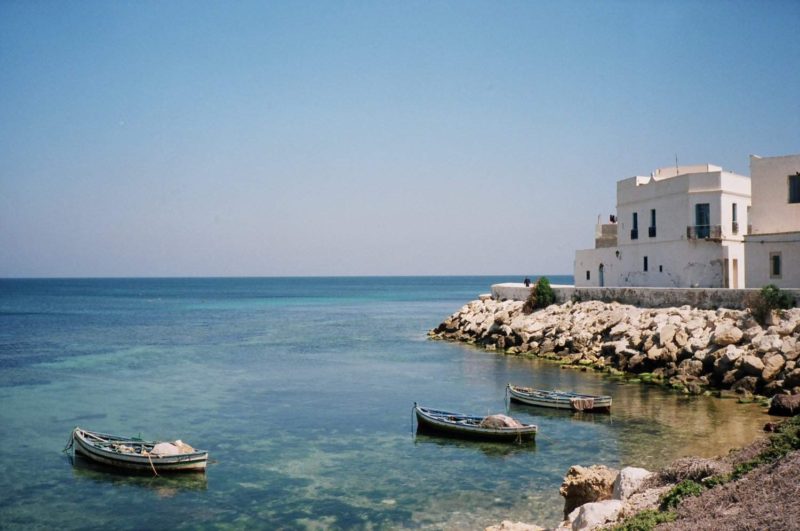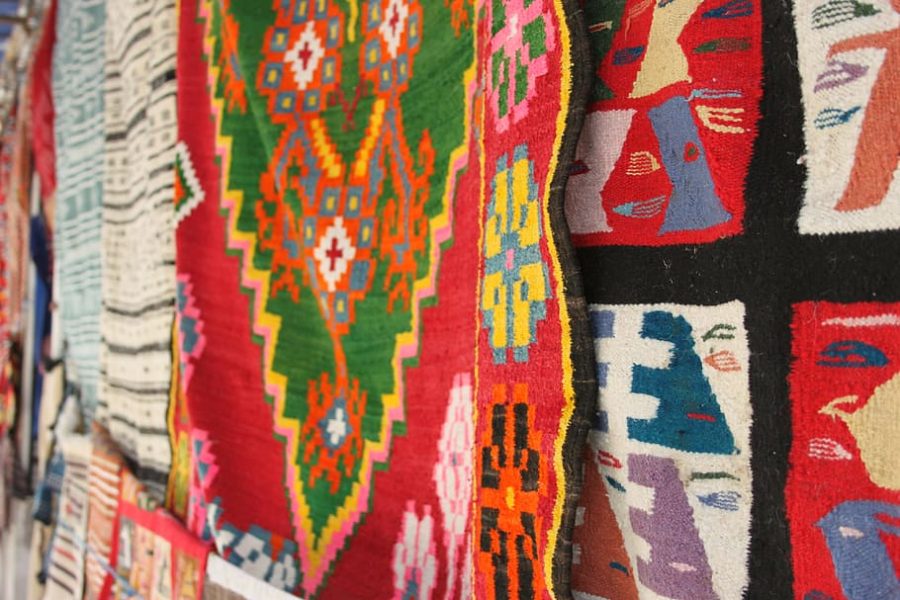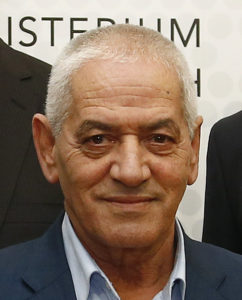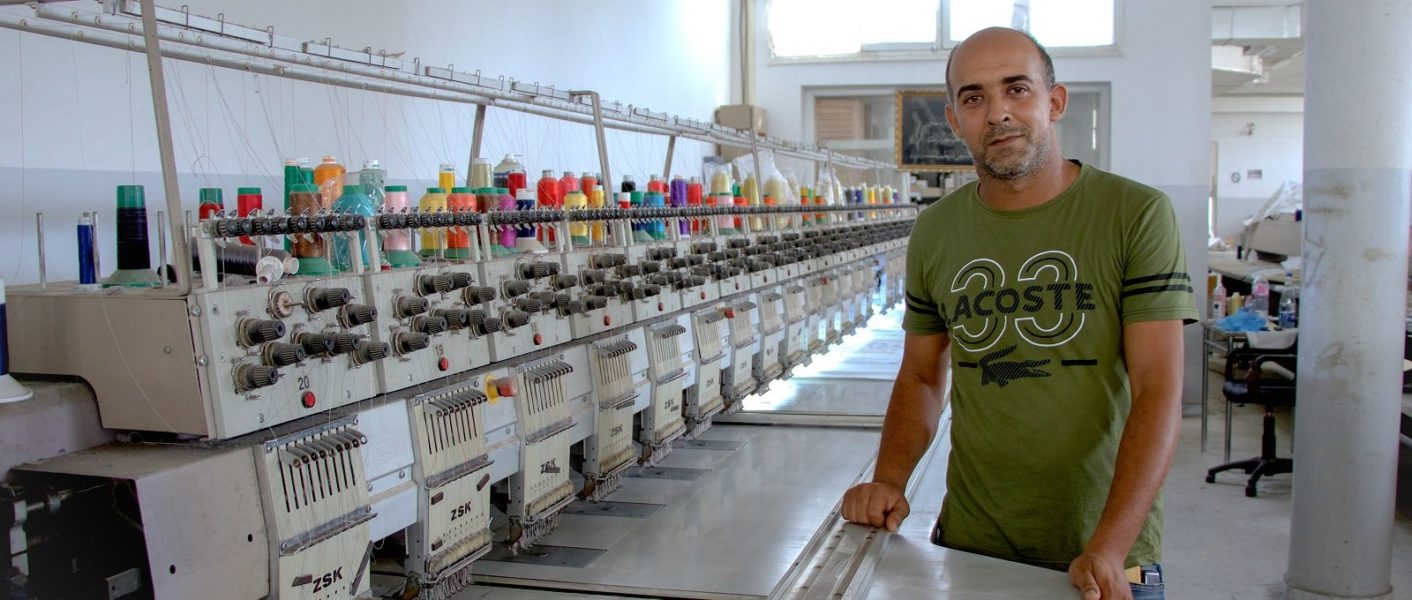Walking between the machines at the Sobref textile factory, Mohamed Ali takes a pair of scissors, cuts a piece of fabric and dips it into a cup of water. Poof! The magic of chemistry works immediately and the piece of cloth is transformed into a translucent, sticky paste. As it dries, it hardens and turns into plastic. “It’s viseline,” explains Ali, proud of his demonstration. Made using synthetic fibres, it is used to reinforce embroidery. “In the past, we polluted the environment with our discarded production waste. From now on, we’re going to recover the scraps to recycle and reuse them.”
Until 2016, dozens of workers at the factory, located in Mahdia, central-eastern Tunisia, worked night and day on the large precision machines that now sit motionless and desperately silent. While waiting for activities to resume, Ali has been sleeping here, upstairs on a simple sofa, to make sure there aren’t burglaries. He keeps a watchful eye and a loving gaze on the company that now belongs to him and 40 or so other former employees who decided to buy their factory.
“In the past, we polluted the environment with our discarded production waste. From now on, we’re going to recover the scraps to recycle and reuse them.”
The idea of becoming their own bosses was suggested by the Tunisian General Labour Union (UGTT). The trade union centre has been supervising the project for several months with the help of Spanish NGO l’Asamblea de Cooperación por la Paz, which also provided financial support in addition to the €250,000 contributed by the Valencian Autonomous Community (Spain). A total of €300,000 has been devoted to the project. UGTT has also provided legal support to the workers, who were able to obtain compensation from the previous owner who had decided, illegally, to close the business overnight. They chose to invest the money in taking over their working tools by creating a cooperative in which they are all majority partners. “So that we will never again experience injustice,” says Afifa Najjar – injustice linked, amongst other things, to pollution and environmental damage.
The embroidery sector, and the textile sector in general, has a significant environmental impact that directly affects workers. As Najjar, a 48-year-old mother who has worked half her life at the Sobref factory explains: “We suffer the direct consequences. The unbearable smells…they used to burn the waste not far from our houses.” Scraps of viseline were disposed of haphazardly. This will no longer be the case when the factory reopens at the end of the year, explains Karim Chebbi, a consultant for UGTT
An environmentally responsible company
Chebbi is very familiar with these environmental issues, which is why he was chosen to coordinate the Sobref project. “There are important ecological as well as economic stakes involved for the cooperative. Part of the waste can be resold in a collaborative network in solidarity with other recycling factories to generate a small income,” he says. The future industrial site will also be able to generate 30 per cent of its own electricity thanks to solar panels. “We want to make it possible for the company to be partially energy-independent and reduce its dependence on fossil fuels,” says Chebbi.

On 11 September 2020, the tables at UGTT’s local branch headquarters have been arranged in a ‘U’ shape for a very special meeting. The workers of the Sobref factory are gathering for the first time since their meetings were interrupted by the coronavirus. Chebbi has invited a university professor, the director of Tunisia’s first master’s degree in management, treatment and reuse of waste, to speak on the occasion.
Professor Lotfi Soussia of the Institut Supérieur des Sciences Appliquées et de Technologie (ISSAT) of Mahdia was responsible for providing 20 hours of training, theory and practice. “Respect for nature is above all a culture! It’s our children’s future,” says the professor to his very studious audience.
All of them support the environmentally responsible aspect of the project, including Hedi Ben Hamza, 50, who spent the last 22 years with the company: “It’s new but now every company has to become a friend of the environment. It wasn’t possible before. Why? Because there was only one owner and he thought of nothing but making profits. With this transformation into a cooperative, we will be able to think about ourselves and nature first.”
“Respect for nature is above all a culture! It’s our children’s future,” explains professor Lotfi Soussia to his very studious audience.
The factory workers may not be familiar with the principles of just transition but they are applying them all the same. And while UGTT may not focus on the idea of decarbonising the economy while mitigating effects on employment and resources for workers in vulnerable industries, they have gotten there through an intermediate concept: for the union, the priority remains the improvement of working conditions.
“While it may not be central, UGTT has always had an approach to the question of the environment,” says Chebbi. “Because it’s part of ‘decent work.’ Decent working conditions are how we get to ecology.”

New ideas
Some members of UGTT, however, are working to advance thinking on environmental issues. One of them, Mansour Cherni, has been a pioneer in this regard. He is the national coordinator of the affiliates of Public Services International (PSI) in Tunisia, as well as the number two of the climate section of UGTT’s department of Arab and international relations and migration. He has been involved with the subject since the early 2000s, “especially since 2007, thanks to the former secretary general of the UGTT, who was interested in climate change,” he explains.

“Houcine Abassi, the Nobel Peace Prize winner, he was the one who pushed me and encouraged me. And we started to tackle the problem of the environment,” says Cherni. “We formed a small group of people who are interested in the issue.” It’s been a year now since the climate change section was created. “It’s to raise awareness amongst the decision makers at UGTT, to say ‘pay attention, this is serious.’ It’s made up of five people but we don’t have the necessary means to really exert influence,” says Cherni.
Since 2014, Cherni has attended the climate COP every year at his own expense. And almost every year, he has been the only UGTT-affiliated trade unionist to participate. “It’s to better understand. There’s a very high level of discourse at the COP, but in reality it has no effect. But when you look at civil society, that’s where the work is being done, that’s where the discussions are, where the pressure is. I saw it when the climate agreement was signed in Paris. It was civil society, it was the unions essentially that took action.”
He is aware of the role that workers’ organisations have to play and he knows that the UGTT is lagging behind. Naïma Hammami was the first woman to join the centre’s executive board in 2017 and is also a pioneer in ecological transition within her union.
Cherni looks forward to the day when the centre truly tackles this issue. “It’s my hope, but they’ve been timid so far,” says the soon-to-be septuagenarian. “It’s still not given importance.” As he explains, the union remains fixated on daily struggles instead of coming up with a strategy to “save jobs threatened by climate change”. He explains: “It’s much more important in the long term. My children are the ones who will pay for it very dearly.”
While reversing priorities is difficult in a country that continues to spiral into an interminable social and economic crisis, Cherni would at least like to increase his union’s understanding of the concepts that he has come to understand so well. With the support of PSI, which helped him to secure funding, he was able to help organise four seminars. About 120 people attended these modules, one of which dealt with greenhouse gases produced by fossil-fuel power plants.
Green energy
The energy sector will be one of the most affected by the transition to a low-carbon society. While green energy is still struggling to get off its feet in Tunisia, authorities have an ambitious objective: increasing the share of renewable energy from 4 per cent where it stands today to 30 per cent by 2030. But delays continue to pile up, even as numerous projects have been announced in recent months. Tunisian authorities are highlighting job creation and the advantages it represents for the country’s energy independence.
But UGTT remains sceptical. The trade union centre considers energy to be a public good and as such defends tooth and nail the quasi-monopoly of STEG (Société Tunisienne de l’Électricité et du Gaz), which dominates the production, transport, distribution and sale of energy in Tunisia. The General Federation of Electricity and Gas, the union’s STEG branch, regularly denounces attempts to privatise the sector and what it calls the “commodification of electricity.”
Since 2014, Cherni has attended the climate COP every year at his own expense. And almost every year, he has been the only UGTT-affiliated trade unionist to participate.
This summer, UGTT butted heads with the government, refusing to connect the Tataouine solar power plant to the network, a project resulting from a partnership between the state-owned Entreprise Tunisienne d’Activités Pétrolières and Italian oil and gas giant Eni.
In a Facebook post published in July, then Energy Minister Mongi Marzouk decried the union, referring to their actions as “sabotage”: “Instead of standing on the side of clean energy, the Electricity Federation… is working to undermine initial achievements in this area in violation of the law. Their understanding of the interest of the energy sector and the role of renewable energies is narrow and incorrect,” he said.
Abdelkader Jelassi, secretary general of the General Federation of Electricity and Gas, who could not be reached for interview for personal reasons, gave his reaction through Cherni: “We are not against renewable energy,” he says, “but against people who for 60 years have continuously fed off of the state. They take without giving anything in return. If the private sector wants to use the grid, it has to pay.”

Depending on your perspective, UGTT is either an obstacle to the development of the renewable sector in Tunisia, or the last bulwark protecting public sector workers and consumers. Opening up to the private sector could have very harmful consequences, leading to job destruction and tariff increases. Once again, UGTT is applying the principles of just transition, whether they know it or not. It is difficult to predict how the Tataouine power station project will be managed in the future.
“It can cause us to lose several months,” laments Cherni, who believes that just transition can play a role in political stability. As he explains, by initiating a virtuous circle, creating jobs and new prosperity, it can represent an opportunity for Tunisia.
And UGTT will end up playing an essential role in this process. The union wields significant influence in Tunisia’s political life. It played a decisive role in the first years of Tunisia’s democratic transition and was awarded, along with three other Tunisian organisations, the Nobel Peace Prize in 2015. Just transition in Tunisia will not happen without UGTT. This 21st century idea will need to be realised by this 20th century union. At the Sobref factory, the union has already begun to act. It must now give serious thought to an environmental strategy in order to replicate Mahdia’s innovative experiment.
Source: Equaltimes.org
This post is available in: English Español

